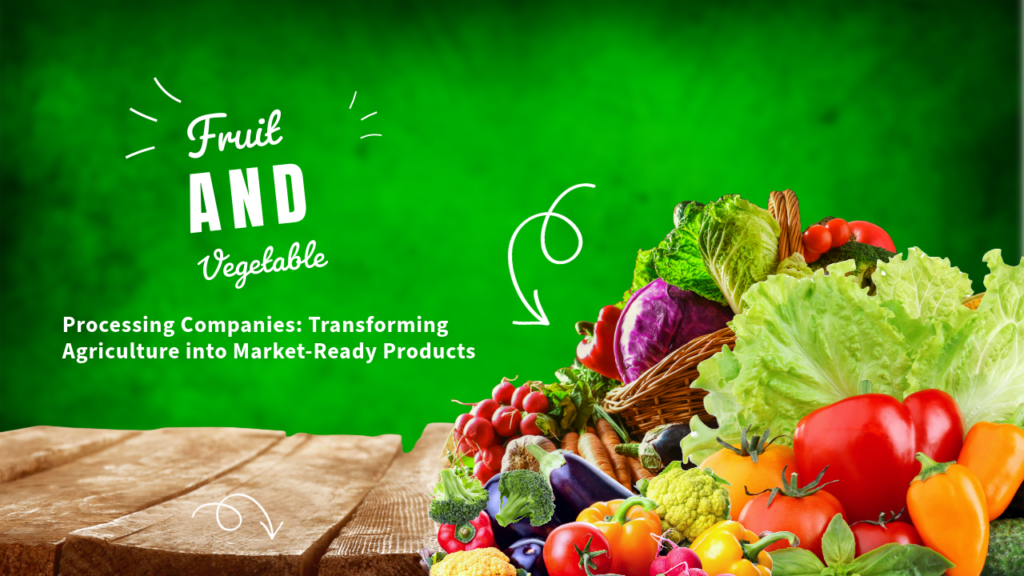Fruit and vegetable processing companies are pivotal in the global food supply chain. These businesses bridge the gap between farms and consumers by transforming fresh produce into ready-to-eat or ready-to-cook products. Their contributions extend far beyond convenience, addressing critical issues such as reducing food waste, enhancing food security, and creating employment opportunities. This article delves into the importance, processes, and challenges faced by fruit and vegetable processing companies while offering insights on how they can optimize their operations using modern tools like AI-powered platforms.
Significance of Fruit and Vegetable Processing
- Reducing Food Waste
Approximately one-third of all food produced globally is wasted, much of it due to perishability. Fruit and vegetable processing companies play a key role in mitigating this issue. By preserving produce through techniques like freezing, canning, and drying, they extend the shelf life of these goods. This ensures that surplus or aesthetically imperfect produce, which might otherwise go to waste, is efficiently utilized. - Enhancing Food Security
Processed fruits and vegetables contribute to food security by making nutritious products accessible year-round. Seasonal produce is transformed into products that can be consumed anytime, ensuring that communities have access to essential vitamins and nutrients, irrespective of seasonal variations. - Meeting Consumer Demand
Modern consumers prioritize convenience, and processed fruits and vegetables cater to this demand. Ready-to-eat salads, frozen vegetables, and canned fruits save time in meal preparation without compromising on nutrition.
Common Processing Methods
Fruit and vegetable processing companies employ various techniques to transform raw produce into market-ready products. The methods chosen depend on the type of produce and the desired end product.
- Canning
Canning involves preserving fruits and vegetables in airtight containers to prevent microbial contamination. This method is popular for products like tomatoes, peaches, and green beans. - Freezing
Freezing locks in the freshness and nutrients of produce, making it a preferred choice for products like berries, peas, and spinach. Quick-freezing techniques ensure the texture and taste remain intact. - Drying
Drying reduces the water content in fruits and vegetables, increasing their shelf life. Commonly dried products include raisins, apricots, and sun-dried tomatoes. - Juicing and Pulping
Juices and purees are derived from fruits and vegetables for use in beverages, sauces, and baby foods. This process often involves pasteurization to ensure safety and longevity. - Pickling and Fermentation
These methods involve preserving produce in vinegar or brine solutions. Pickles, kimchi, and sauerkraut are popular examples.
Challenges in the Industry
Despite their critical role, fruit and vegetable processing companies face several challenges:
- Supply Chain Issues
Fluctuations in produce supply, often driven by weather or market conditions, can disrupt operations. Ensuring a consistent flow of quality raw materials is a persistent challenge. - High Operational Costs
Processing requires sophisticated machinery, energy, and labor, which can drive up costs. Small and medium-sized enterprises (SMEs) often struggle to compete with larger corporations due to these expenses. - Stringent Regulations
The food industry is highly regulated to ensure safety and quality. Compliance with these standards requires constant monitoring and adaptation, which can be resource-intensive. - Technological Gaps
Many companies still rely on outdated technologies, which hinder efficiency and innovation.
Opportunities for Growth
- Adopting Automation and AI
Automation can significantly reduce manual labor and enhance efficiency. AI tools, such as predictive analytics, can help companies forecast demand, manage inventory, and optimize production. - Expanding Product Lines
Diversifying offerings, such as introducing organic or exotic fruit and vegetable products, can help companies cater to niche markets and increase revenue streams. - Sustainability Initiatives
Sustainable practices, such as utilizing food waste for by-products or switching to eco-friendly packaging, can appeal to environmentally conscious consumers and improve brand reputation. - Global Market Penetration
Exporting processed products to international markets offers significant growth potential. Companies can leverage trade agreements and digital platforms to reach new customers.
How Websitebuilder.ai Can Help
In the era of digital transformation, having a strong online presence is crucial for fruit and vegetable processing companies. Tools like Websitebuilder.ai provide an efficient and user-friendly way to build and manage websites.
- Streamlined E-Commerce Integration: With Websitebuilder.ai, companies can easily set up an online store to showcase and sell their products directly to consumers or distributors.
- Custom Branding Options: The platform allows businesses to create professional, branded websites that stand out in the competitive market.
- AI-Powered Features: From inventory management to customer engagement tools, Websitebuilder.ai provides intelligent solutions to enhance operational efficiency.
- Cost-Effective Solution: Small and medium-sized companies can benefit from this affordable platform without needing extensive technical expertise.
By leveraging tools like Websitebuilder.ai, fruit and vegetable processing companies can expand their reach, improve customer engagement, and achieve long-term growth in the competitive food industry.
Conclusion
Fruit and vegetable processing companies are indispensable in the global food ecosystem, offering solutions to food waste, consumer convenience, and nutritional needs. Despite the challenges, advancements in technology and sustainable practices present immense growth opportunities. Platforms like Websitebuilder.ai can play a vital role in helping these businesses thrive by empowering them with cutting-edge digital tools to build a robust online presence.
